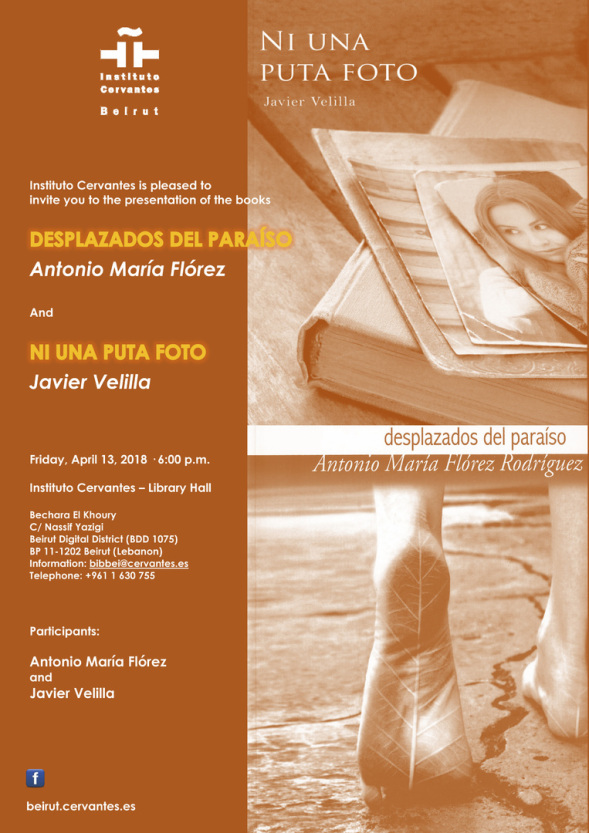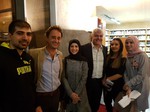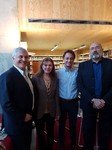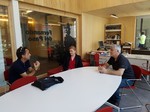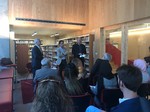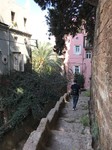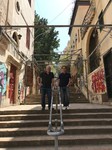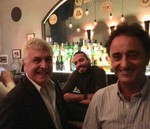Instituto Cervantes Beirut
Con Antonio María Flórez, presentando Desplazados del Paraíso y Ni Una Puta Foto el 13 de Abril, 2018, en el Instituto Cervantes de Beirut.
NI UNA PUTA FOTO
BEIRUT, 13 DE ABRIL DE 2018
INSTITUTO CERVANTES
Javier quería ser escritor.
Javier quería ser escritor desde que tuvo edad de contestar cuando le preguntaban qué quieres ser de mayor. Y sin embargo Javier era Ingeniero, y el 1 de Julio de 2006 llegó a Oxford con su familia y allí se quedaron todos durante 6 años llenos de felicidad y sueños que se iban haciendo realidad.
El 7 de julio la mujer y los hijos de Javier se fueron de vacaciones, de vuelta a España, y él se quedó solo, en su preciosa casa en medio de la campiña inglesa, con un jardín esplendoroso, durante días que no acababan nunca, tantas horas de sol, tantas flores, olores y sentimientos a los que aún no sabía poner nombre. Javier tenía 41 años y un agujero negro en su alma, a punto de abrirse, de forma brutal e inesperada: Javier dedicó una semana entera a leer sus diarios de pre y post adolescencia, que aparecieron en una caja de la mudanza, como por arte de magia, entre libros de García Márquez, el Rayuela de Julio Cortázar y un parchís al que le faltaban dos fichas amarillas.
Luis Cortés nació como el protagonista de una novela, decidido a hacer un viaje en el tiempo
Un viaje en el tiempo para enfrentarse cara a cara con las cinco mujeres que marcaron su juventud, darle a cada una el fragmento de sus diarios que hablaba de ellas, y a cada una pedirle una foto de esa época, 15, 20, 25 años atrás, porque Luis Cortés descubrió que no tenía ni una puta foto de ninguna de sus antiguas novias. Mientras su familia descansaba en su playa, ajena a todo, Luis viajó al pasado durante una semana loca en la que quiso encontrar respuesta a preguntas y dilemas que sólo eran importantes para él.
Luis Cortés hizo su viaje y se enfrentó a las cinco mujeres que marcaron su juventud, y ya nada volvió a ser igual, ni para él ni para ninguna de ellas, ajeno a todo, inmune al ruido de su propia destrucción.
Javier se hizo escritor.
Javier se dijo a sí mismo que para ser escritor bastaba escribir una novela y vender al menos una copia. Escribió la suya durante años, disfrutó dando voz a sus personajes, cuerpo a la obsesión de Luis Cortés y acción a esa semana loca en la que le pasaron tantas cosas, al bueno de Luis, y así Javier no tuvo que hacer su viaje en el tiempo, porque Luis lo hizo en su lugar.
El mundo de Javier se derrumbó mientras escribía, la muerte llamó a la puerta de su casa y se aferró al pulmón de su esposa, y Javier siguió escribiendo en habitaciones de hospital, salas de quimioterapia, en una casa de donde desaparecieron la esperanza, las sonrisas y las ganas de vivir. Javier y su mujer hablaban de la novela y los dos sabían que ella nunca la leería, y los dos se miraban aterrorizados mientras las gotas de la quimioterapia inútil envenenaban su sangre.
Luis Cortés encontró a La Duquesa en Alicante, en el inicio de su viaje.
Se presentó sin avisar y en tres horas de café y charla logró decirle más de lo que le había dicho en toda su vida, en todos los años de citas frustrantes y amagos que los llevaron a ninguna parte, una y otra vez. Luis le explicó qué hacía allí, hizo sus preguntas, contestó a las de ella y cuando la abrazó supo que todo tenía sentido: olió olores olvidados, recordó recuerdos perdidos, sintió sentimientos escondidos y su sangre cambió de color y de velocidad, y un regusto a felicidad inundó su boca, que ya no dijo nada más, porque no hizo falta decir nada más. Al final del fragmento de los diarios que le dejó escribió también una carta, que cerró con esta frase:
Y tú iluminaste y ensombreciste mis días, durante muchos años, alimentaste mis deseos, mis pasiones y mi corazón con más fuerza que cualquier otro ser vivo con el que me haya topado en este planeta. Y de esta forma tan poco romántica te digo adiós, otra vez, que supongo será la última, otra vez. Lola Duque. La Duquesa, mi Duquesa.
Javier descubrió que estaba solo en su sueño.
Mendigó la atención de algunos que ya eran escritores, envió su manuscrito a 20 editoriales, y descubrió que estaba solo, que ninguno de ellos le iba a ayudar. Así que Javier, que ya no tenía ni mujer ni esperanzas, pagó por ser escritor, se auto editó, contrató a un autor famoso para que le presentara, y pagó también por ir a una radio marginal, y a una televisión que casi nadie ve, y para salir en una entrevista en You Tube, perdida en una nube infinita y sorda, ciega y negra.
Javier pagó para que un profesional le hiciera su primera crítica literaria: “Es muy buena, sorprendentemente buena, a la altura de lo mejor que se ha publicado en los últimos años”.
Javier pensó “qué vas a decir, si te he pagado yo por este trabajo”
Luis Cortés visitó a Kika sin avisar, en Madrid
En el corazón de una ardiente noche de verano, que acabó de forma inesperada, sentado en la hierba del boulevard de la calle Arturo Soria, luchando con las lágrimas que bañaban sus ojos y no le dejaban leer el pedazo de su diario que había preparado para ella, ni la carta que acababa de escribir:
Estoy en Madrid, con la esperanza de que nos veamos de nuevo, con la ilusión de compartir estos papeles contigo, de comprobar la sospecha que tengo de que cuando estemos frente a frente será como si no hubiese pasado el tiempo, que nos seguiremos llevando tan bien como nos llevábamos, que podremos hablar interminablemente, reírnos del mundo y de nosotros mismos, de lo patéticos que fuimos y de por qué creemos que las cosas pasaron como pasaron.
Javier aún no sabía si su libro era bueno o no.
Pero el famoso escritor que le iba a presentar empezó a leer su novela, y no dejó de leer hasta terminarla. Y el amigo poeta de Javier la leyó también, y más gente con criterio, y a todos les gustó, y de repente empezó a creer que sí, que había creado algo que podía hacer sentir, despertar interés, emocionar: Literatura. Y Javier habló de todo eso en la radio y en la televisión, creyendo lo que decía, y presentó su novela en una noche mágica del mes de Junio de 2017, en Madrid, frente a ciento veinte personas entregadas, y Javier fue escritor, y Javier fue feliz.
Luis Cortés comió con Cita, y le acabó prestando 100 euros
Y de ese primer encuentro con su eterno amor platónico salió con cara de bobo, y sin respuesta a la pregunta que le quería hacer
Te recuerdo con frescura, tal vez porque éramos tan jóvenes entonces. Me lo tomé todo con una cierta dosis de ironía y humor, dentro del esperado sufrimiento en mi papel de amante platónico no correspondido. El desenlace final, la forma en que se desarrollaron las cosas, no deja de tener su gracia, aunque entonces el dramatismo me provocara un sufrimiento insoportable, y de algún modo me quisiera morir.
Pienso que nos lo dijimos y explicamos todo, tal vez sólo nos falta entender por qué nos alejamos tanto y tan de repente, por qué desaparecimos de nuestras vidas sin remisión.
Javier fue escritor, y siguió escribiendo.
Javier vivía ya en Arabia, y allí se imaginó enamorado de unos ojos negros, escondidos detrás de un niqab impenetrable, y escribió esa historia de amor. Escribió también sobre unos ojos verdes que pusieron su mundo del revés, sin remedio, hasta que la locura dejó de tener sentido y la cruel realidad lo devolvió a la cruel realidad.
Javier exploró los límites de la poesía, y los micro relatos que caben en un post de Instagram y nadie lee, y los que se escriben con un número de palabras que puedes contar con los dedos de una mano, y ya no supo si lo que hacía era literatura o no, entretenido como estaba en contar los “likes” recibidos en cada una de sus publicaciones.
Carolina no quiso hablar con Luis Cortés
Necesito al menos que seas consciente de que te quise, aunque todo acabó tan mal, que a pesar de lo mezquino, egoísta y cruel que fui contigo, a pesar de que no te di nada, ni un minuto de verdadero placer, un pellizco de sinceridad o de verdad, entraste en mi vida como un rayo de luz, que me enamoraste, que eras una mujer perfecta y que tiré por la borda esa lotería que me había tocado sin jugarla.
Te engañé tantas veces, me engañé a mí mismo tantas veces, que hoy me parece mentira.
Perdóname.
Y Javier tuvo lectores
Y una noche uno lejano contactó con Javier para decirle que estaba leyendo Ni una puta foto, que le estaba encantando, y Javier sintió la magia de la literatura, se imaginó en la piel de ese lector, y le esperó en la siguiente esquina del relato, agazapado, esperando con ansia la reacción ante su siguiente truco, la siguiente escena, el siguiente giro de la acción.
Hubo muchos más lectores, más preguntas, más noches de comentarios, y cada una de esas noches Javier fue el hombre más feliz del mundo, y se preguntó si por esto habría merecido la pena tanto esfuerzo, tantas horas de correcciones y dudas, y se preguntó una vez más si eso sería ser escritor, aunque ya sabía la respuesta.
Maga
Te quise tanto, Maga, que al menos quiero que eso te quede claro, en el caso de que lo hayas olvidado, en el caso de que pensaras que todo fue una mentira o un sueño. Te quise tanto, me ayudaste tanto, me cambiaste tanto… Ojalá no desparezcas de mi vida otros veinte años, dondequiera que estés. Y quiero también que sepas que nunca te olvidé, que te he extrañado todos estos años, de una manera imprecisa pero permanente, que he guardado tus cartas, que fuiste una parte tan profunda de mí en momentos tan importantes, cuando maduré, cuando me hice el hombre que ahora soy, en unos meses de locura en los que hice tantas cosas, en los que me atreví con todo, pero en los que al final no encontré hueco para ti, pobre de mí.
Y Javier fue Luis Cortés
Quiso vivir el viaje que sólo había imaginado, comprobar si era posible, si uno puede caer en paracaídas en la vida de alguien, tantos años después, y que pasen las cosas que le pasaron a Luis Cortés.
Javier se encontró con Kika, que leyó la novela, y Kika quiso volver a verle y le trajo una foto de aquellos tiempos. Y Kika quiso besarlo, y viajar con él, y amarlo, a pesar de que Kika estaba muerta.
Javier se encontró con La Duquesa, que leyó la novela en 24 horas, y le dijo que aún le quería, que siempre le había querido, y Javier miró y miró la foto que le había traído y sonrió sin decir nada.
Javier habló durante horas con Carolina, que fue la Carolina que había imaginado. Y ella le explicó a Javier cómo la había dejado, tantos años atrás, repitió cada palabra que él pronunció, en su destartalado Mini rojo, la noche en que le partió el corazón. Javier pidió perdón otra vez, aunque ya no hacía falta.
Javier aún anda buscando a Cita y a Maga, que en algún lugar del mundo esperan leer esos diarios que Luis Cortés ya llevó hasta ellas, porque hay historias que aún no se han escrito, y algún día se escribirán.
Y Luis Cortés volvió a casa, al final de su viaje, a encontrase con su mujer, Amalia
Hace mucho que no te escribo, hace mucho que no te pienso en profundidad, sin distracciones, que no repaso lo que has sido y lo que eres en mi vida. Hace mucho que no te pido perdón, demasiado tiempo que no te beso con pasión, que te estrujo sin compasión como a ti te gusta, que no recorro con mi lengua la tuya, que no te acaricio las caderas, que no te hago cosquillas en la espalda. Hace mucho, Amalia, que no te digo lo que te quiero, lo milagroso que es que lo que siento por ti haya sobrevivido a estos años de hijos, de sobresaltos, de trabajo agotador, de toneladas de sacrificios, aplastándonos sin compasión, alejándonos uno del otro como sin querer. Hace mucho que no te digo lo increíble que resulta tu cuerpo alucinante, vencedor implacable frente al paso del tiempo y cuatro partos, después de tanto dar, de tanto olvidarte de ti misma de forma sistemática y minuciosa, cada minuto, cada hora del día, de cada día de este matrimonio y esta familia que son desde hace tanto la única razón de tu vida.
Hoy he decidido hacerlo
Epílogo
Hay en la novela un personaje al que Luis Cortés no tenía en sus diarios. Sabela se cruzó de forma inesperada en su viaje, y derrumbó tantas cosas, en tan poco tiempo, que ese encuentro hizo posible todo lo demás. Tal vez Sabela hizo posible Ni Una Puta Foto, tal vez fue también la energía que necesitó Javier para llegar hasta el final.
Y el paseo por Madrid es un paseo por el cielo, tan inesperado, tan surrealista, con una mujer que acaba de conocer y que lo ha desarmado, que ha tumbado en un par de horas barreras levantadas durante lustros, y su mundo está del revés cuando suben las escaleras al segundo piso, no hay ascensor, y la cabeza le está girando un poco más de la cuenta, y el corazón le late un poco más deprisa de lo que él quisiera, y a medida que sigue a Sabela por esos escalones que no acaban comprueba lo atractiva, lo guapa, lo increíblemente joven que es, y lo cerca que está de ella…
El 24 de marzo de 2018, hace exactamente 3 semanas, Javier se encontró con Sabela en el aeropuerto de Bruselas, durante tres horas, a unos metros de la puerta de embarque desde la que ella había salido de su vida, para no volver, dos años atrás. Con las manos entrelazadas sobre las migas de un croissant de jamón y queso que no habían podido terminar, Sabela miró a Javier y dijo “I still love you”, y Luis Cortés respondió “I love you too”, y todo pareció tener sentido durante unos minutos, el tiempo que tardó Javier en volver a ser Luis, y Luis en volver a ser Javier. El tiempo que tardó Sabela en montarse en un avión que se la llevó a la India, y Javier en otro que le devolvió a Arabia, donde ya no había ojos verdes en los que mirarse. Dónde ya sólo quedan sueños y promesas rotas, y el ruido de un futuro que revolotea inquieto, descabezado y amenazador, tal vez prometedor. Un futuro sin nombres propios donde el eco de otros “I love you” se apaga sin remisión.
Javier quiere seguir siendo escritor.
Quiero volver a sentir, quiero tenerla a mi lado.
Quiero oír su voz, esa canción,
aquel verso asesino, apasionado.
Ese horrible final, a mitad de un mes de mayo.
Quiero volver a escribir, quiero volver a sentir.
Quererlo todo no es malo.
ENGLISH VERSION
Javier wanted to be a writer
Javier wanted to be a writer since he was old enough to answer when they asked him “what you want to be when you grow up”. And yet Javier was an Engineer, and on July 1, 2006, he arrived in Oxford with his family and they stayed there for 6 years full of happiness and dreams that were coming true.
On July 7, Javier's wife and their children went on vacation, back to Spain, and he was left alone, in his beautiful house in the middle of the English countryside, with a splendid garden, enjoying days that never ended, so many hours of sun, so many flowers, smells and feelings that he did not know how to name yet. Javier was 41 years old and had a black hole in her soul, about to open, in a brutal and unexpected way: Javier spent a whole week reading his pre and post adolescence journals, which appeared in a moving box, as if by art of magic, between books by García Márquez, Rayuela by Julio Cortázar and a parchís that lacked two yellow chips.
Luis Cortés was born as the protagonist of a novel, determined to make a journey in time
A time travel to meet face to face with the five women who marked his youth, to give each one the fragment of his diaries that spoke of them, and to ask for a photo of that time, 15, 20, 25 years ago , because Luis Cortés discovered that he did not have a fucking picture of any of his former girlfriends. While his family rested on the beach, Luis traveled to the past during a crazy week in which he wanted to find answers to questions and dilemmas that were only important to him.
Luis Cortés made his trip and confronted the five women who marked his youth, oblivious to everything, immune to the noise of his own destruction, and nothing was the same again after, neither for him nor for any of them.
Javier became a writer
Javier told himself that to become a writer he only needed to write a novel and sell at least one copy. He wrote his for years, enjoyed giving voice to his characters, body to the obsession of Luis Cortés and action to that crazy week in which so many things happened to Luis, and so Javier did not have to make his time travel, because Luis did it for him.
Later, Javier's world collapsed, death knocked on the door of his house and attacked her wife's lung, and Javier found himself writing in hospitals, chemotherapy rooms, in a house where hope, smiles and the will to live disappeared forever. Javier and his wife talked about the novel and the two knew that she would never read it, and both looked at each other, terrified, as the drops of the useless chemotherapy poisoned her blood.
Luis Cortés found La Duquesa in Alicante, at the start of his trip.
He showed up unannounced and in three hours of coffee and talk he managed to tell her more than in his whole life, in all the years of frustrating appointments that took them nowhere, again and again. Luis explained what he was doing in Alicante, asked his questions, answered hers and when they hugged he knew that everything made sense: he smelled forgotten smells, remembered lost memories, felt hidden feelings and his blood changed color and speed, and a happiness aftertaste flooded his mouth, which did not say anything else, because it was not necessary to say anything else. At the end of the fragment of the diaries that he left with her he also wrote a letter, which closed with this sentence:
And you enlightened and overshadowed my days, for many years, you nourished my desires, my passions and my heart with more strength than any other living creature that I have encountered on this planet. And in this unromantic way I say goodbye, again, which I suppose will be the last one, again. Lola Duque, my Lola.
Javier discovered that he was alone in his dream
He begged the attention of some writers, sent his manuscript to 20 publishers and discovered that he was alone, that no one was going to help him. So Javier, who no longer had a wife or any hope, paid to be a writer, self-edited, hired a famous author to introduce him, and also paid to go to a marginal radio, to a television that almost nobody sees, and for a You Tube interview on, lost in an infinite deaf, blind and black cloud,.
Javier paid for a professional to make his first literary review: "It's very good, surprisingly good, at the height of the best that has been published in recent years."
Javier thought "what are you going to say, if I paid for this job?"
Luis Cortés visited Kika without warning, in Madrid
In the heart of a hot summer night, which ended unexpectedly, sitting on the grass of the boulevard of Arturo Soria Street, struggling with the tears that bathed his eyes and did not let him read the piece of his diary that he had prepared for her, and the letter he had just written: I am in Madrid, with the hope that we will see each other again, of sharing these papers with you, of verifying my suspicion that when we are face to face it will be as if the time has not passed, that we will continue as cool as we were, that we will talk endlessly, laugh at the world and ourselves, remembering how pathetic we were and guessing why things happened as they did.
Javier still did not know if his book was good or not
But the famous writer who was going to present him began to read his novel, and could not stop until it was finished. And Javier's poet friend read it too, and more people with judgment, and everyone liked it, and suddenly he began to believe that yes, he had created something that could make people feel, arouse interest, excite: Literature. And Javier talked about all that on the radio and on television, believing what he said, and presented his novel on a magical night in June 2017, in Madrid, in front of one hundred and twenty attonished people, and Javier was a writer, and Javier was happy.
Luis Cortés had lunch with Cita, and ended up giving her 100 euros
And from that first encounter with his eternal platonic love he came out with a fool face, and without an answer to the question he wanted to ask her.
I remember you with freshness, maybe because we were so young then. I took everything with a certain dose of irony and humor, within the expected suffering in my role as an unrequited platonic lover. The final outcome was somehow funny, although then the drama provoked an unbearable suffering, and somehow I wanted to die.
I think we told and explained everything, maybe we just need to understand why we are so far away and so suddenly, why we disappeared from our lives without
Javier became a writer, and he continued to write.
Javier was already living in Arabia, and there he imagined himself in love with some black eyes, hidden behind an impenetrable niqab, and wrote that love story. He also wrote about some green eyes that put his world upside down, without remedy, until the madness stopped making sense and the cruel reality returned him to the cruel reality.
Javier explored the limits of poetry, and the micro stories that fit in an Instagram post and nobody reads, and those that are written with a number of words that you can count on the fingers of one hand, and no longer knew if he was doing literature or not, distracted as he was in counting the "likes" received in each of his "posts".
Carolina didn’t want to talk to Luis Cortés
I need at least to be sure that you know I loved you, although everything ended so badly, that despite the petty, selfish and cruel that I was with you, even though I did not give you anything, not a minute of real pleasure, a pinch of Sincerity or truth, you entered my life as a ray of light, I fell in love, you were a perfect woman and I threw away that lottery that had touched me without playing it.
I deceived you so many times, I deceived myself so many times, that today I think it can´t be true.
Forgive me.
And Javier had writers
And one night a distant reader contacted Javier to tell him that he was reading No fucking photo, that he was loving it, and Javier imagined himself in the skin of that reader, and waited for him in the next corner of the story, crouching, guessing with anxiety his reaction to the next scene, to the next turn of the action.
There were many more readers, more questions, more nights of comments, and each one of them Javier was the happiest man in the world, and he wondered if that would have been worth so much effort, so many hours of corrections and doubts, if all that was being a writer, although he already knew the answer.
Maga
I loved you so much, Maga, that at least I want that to be clear to you, in case you have forgotten, in case you thought that everything was a lie or a dream. I loved you so much, you helped me so much, you changed me so much ... I hope you do not disappear from my life another twenty years, wherever you are. And I also want you to know that I never forgot you, that I have missed you all these years, in an imprecise but permanent way, that I have kept your letters, that you were such a deep part of me in so important moments, when I matured, when I became the man that I am now, in a few months of madness in which I did so many things, in which I dared with everything, but in which in the end I found no space for you, shame on me.
Y Javier became Luis Cortés
He wanted to live the trip he had only imagined, to see if it was possible for someone to experience the things that happened to Luis Cortés.
Javier met up with Kika, who read the novel, and came back to see him again, and brought him a picture from the old days. And Kika wanted to kiss him, and travel with him, and love him, even though Kika was dead, and she knew it.
Javier met the Duchess, who read the novel in 24 hours, and told him that she was still in love, that she had always loved him, and Javier looked and looked at the picture that she had brought, and smiled without saying a word.
Javier talked for hours with Carolina, who was like the Carolina he had imagined. And she explained to Javier how he had left her, so many years ago, she repeated every word he uttered, in his ramshackle Red Mini, the night he broke her heart. Javier apologized again, although it was no longer necessary.
Javier is still looking for Cita and Maga, who somewhere in the world hope to read those journals that Luis Cortés already brought to them, because there are stories that have not yet been written, and someday will be written.
And Luis Cortés returned home, at the end of his trip, to meet his wife, Amalia
I have not written to you for a long time, I have not thought about you in depth for a long time, without distractions, a long time since I do not review what you have been and what you are in my life. I have not asked for your forgiveness for a long time, I have not kissed you with passion, or squeeze you the way you like, too long since I do not run my tongue on yours, caress your hips, tickle your back . Long ago, Amalia, I do not tell you that I love you, how miraculous it is that what I feel for you has survived these years of children, of startles, of exhausting work, of tons of sacrifices, crushing us without compassion, moving us away of the other unintentionally. Long ago I do not tell you how amazing your body is, unrelenting winner against the passage of time and four births, after so much you have given, forgetting yourself in a systematic and meticulous way, every minute, every hour of the day, of each day of this marriage and this family that have been the only reason for your life for so long.
Today I decided to do it
Epilogue
There is a character in the novel that Javier did not have in his diaries. Sabela crossed unexpectedly in the journey of Luis Cortés, and collapsed so many things, in such a short time, that this meeting made everything else possible. Maybe Sabela made Ni Una Puta Foto possible, in some way that only Javier understands.
And the walk through Madrid is a walk through the sky, so unexpected, with a woman who has just met and who has disarmed him, who has knocked down in a couple of hours barriers raised for decades, and his world is turned upside down when the climb the stairs to the second floor, there is no elevator, and the head is spinning a little more than necessary, and the heart beats a little faster than he would like ...
On March 24, 2018, exactly 3 weeks ago, Javier met Sabela at the Brussels airport, for three hours, a few meters from the boarding gate from which she had left his life, not to return, two years ago. With their hands clasped over the crumbs of a ham and cheese croissant that they had not been able to finish, Sabela looked at Javier and said "I still love you", and everything seemed to make sense for a few minutes, the time it took for Javier to return to be Luis, and Luis to be Javier again. The time it took Sabela to get on a plane to India, and Javier in another back to Arabia, where there were no longer any green eyes to look at. Where only dreams and broken promises remain, and the noise of a future that flutters restlessly, headless and menacing, perhaps promising. A future without proper names, where the echo of other "I love you" goes off without remission
Javier wants to continue writing
I want to feel again, I want to have her by my side.
I want to hear her voice, that song,
that murderous, passionate verse.
That horrible end, in the middle of a month of May.
I want to write again, I want to feel again.
Wanting everything is not bad.
